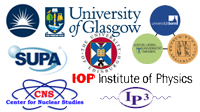
SPONSORS
 HOME
HOME PARTICIPANTS
PARTICIPANTS SPEAKERS
SPEAKERS PROGRAM
PROGRAM POSTERS
POSTERS SCHEDULES
SCHEDULES REGISTRATION
REGISTRATION DIRECTIONS
DIRECTIONS SPONSORS
SPONSORS SIDE BAR . . .
SIDE BAR . . . PHOTOS
PHOTOS
ORGANIZING COMMITTEE
William Briscoe
David Ireland
Maxim Polyakov
Igor Strakovsky
Daniel Watts
CONTACT:
Daniel Watts
University of Edinburgh
TEL: 0131 650 5286
![]() Print Version
Print Version

Predictions, Evidences, Perspectives
June 8 - 10
S P O N S O R S
in alphabetical order ...
| Center
for Nuclear Studies (CNS) The Center for Nuclear Studies is a university-sponsored Center of Excellence. The CNS provides the organizational umbrella for many of the research efforts in nuclear physics in the Department of Physics at The George Washington University. The basic objective of these efforts is to contribute to the world's understanding of the dynamics and structure of nuclear matter, whether at the level of the atomic nucleus itself, at the subnuclear level of nucleons and mesons within the atomic nucleus, or even at the sub-subnuclear level where one deals with elementary constituents of nucleons and mesons. This objective is pursued both experimentally and theoretically, with an equal balance between experiment and theory. On the experimental side, it requires devising experiments where one bombards nuclei with various probes – for example, electromagnetic radiation, electrons, mesons, protons, or other nuclei – and measures the resulting final fragments to gain information about the forces acting both between the constituents of the targets and between projectiles and targets. On the theoretical side, this interpretation of experimental findings requires the guidance of dynamical theories that provide models for the reactions under scrutiny, making predictions as to their possible outcome. It is the iterative process of theoretical predictions and subsequent experimental findings, leading in turn to more refined theoretical descriptions and hence better predictions, which drives the quest for knowledge in physics.  |
|
| Institute
for Particle Physics Phenomenology (IPPP) The Institute for Particle Physics Phenomenology aims to foster world-class research in particle physics phenomenology - the bridge between theory and experiment in the study of the tiny building blocks of all matter in the universe and of the fundamental forces that operate between them. We are trying to understand what happens when high energy particles are smashed into each other at very high energies and we provide the theory and analysis behind a number of experiments to be carried out at the Large Hadron Collider (LHC), a gigantic particle accelerator built 100m underground on the Swiss/French border at Geneva, which aims to recreate conditions in the early Universe just after the Big Bang. We are seeking answers to some of the Universe’s greatest secrets such as the mysteries surrounding antimatter and dark matter, the possibility of extra space-time dimensions and the existence of the elusive Higgs boson. The IPPP is a joint venture of Durham University and the UK Science and Technology Facilities Council (STFC) It is part of the Centre for Particle Theory in Durham, based jointly in the Departments of Mathematical Sciences and Physics. The activities of the IPPP are overseen by a steering committee with both internal and external members. Together with the Institute for Computational Cosmology, the IPPP forms part of the Ogden Centre for Fundamental Physics, housed in a new building adjacent to the Physics Department. The building was officially opened by the Prime Minister on 18th October 2002, and the Inauguration Day for the Ogden Centre took place on 15th November 2002.  |
|
|
Institute
of Physics (IOP) The nuclear physics group of the Institute of Physics contributed to the funding of this event.  |
|
|
Science
and Technology Facilities Council (STFC) We were formed as a new Research Council on 1 April 2007 through a merger of the Council for the Central Laboratory of the Research Councils (CCLRC) and the Particle Physics and Astronomy Research Council (PPARC) and the transfer of responsibility for nuclear physics from the Engineering and Physical Sciences Research Council (EPSRC). We are one of seven national research councils in the UK. STFC is a science-driven organisation. We make it possible for a broad range of scientists to do the highest quality research tackling some of the most fundamental scientific questions.  |
|
| Scottish
Universities Physics Alliance (SUPA) Six Scottish Universities have come together to form a research alliance in Physics. The aim is to place Scotland at the forefront of research in Physics through an agreed national strategy, an inter-institutional management structure, and co-ordinated promotion and pursuit of excellence. Adopting a coherent approach to staffing strategy, research training, research initiatives and funding opportunities, SUPA™ will pool and enhance Scotland's strongest Physics research areas and will develop as a world leader in Physics, creating the largest group of Physics researchers in the UK. It is also intended as a single "front door" for potential staff, sponsors, and industrial collaborators. The alliance brings together internationally leading physics research across Scotland to form the largest physics grouping in the UK. Major research themes being pursued are astronomy, condensed matter and materials physics, nuclear and plasma physics, elementary particles, photonics and physics and life sciences.  |
|
|
Transregio (SFB/TR 16) The research programme of the SFB/TR 16 focuses on the nature and inner structure of particles which are subject to the strong interaction, so called hadrons. It is formed by groups from the universities of Bonn, Bochum and Gießen. Other participating groups from Basel, Erlangen, Groningen and St. Petersburg tightly cooperate with the SFB/TR. At the centre of the SFB/TR is the accelerator facility ELSA in Bonn.  |
|
|
University
of Edinburgh
 |
|
| University
of Glasgow Internationally leading research a flexible learning environment that encourages students and staff to achieve goals working with business, industry and the community to add value to Scottish culture and society, the natural environment and the UK economy and based in the cosmopolitan city of Glasgow. |
HOME | PARTICIPANTS | SPEAKERS | PROGRAM | SPONSORS
2009 © ALL RIGHTS RESERVED








